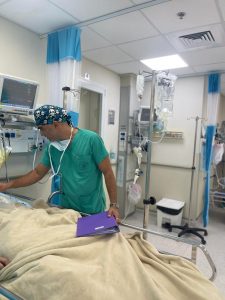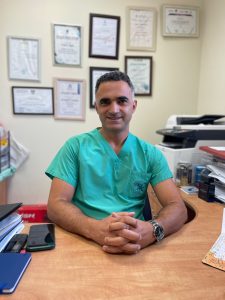
Tamer Hidari at his office at the Nazareth Hospital.
Originally from Sakhnin city, Tamer Hidari is the chief nurse of the operating rooms at the Nazareth Hospital. He is happily married to Haya, a lawyer, and has a four-year-old son named Hassan. In addition to his B.S.N. and M.B.A. from the Hebrew University in Jerusalem, Tamer furthered his studies by learning about leadership and team development at the International Business Management Institute in Berlin and safety and risk management through Inbar and the Israeli Ministry of Health. Tamer is currently an active advisor for the National Health head nurse office.
Tamer’s unique connection with nursing stems from his family history.
I was around 16 or 17 when my grandpa had liver failure and was waiting for a new liver. I travelled with him across different hospitals for two or three years: Hadassah, Rambam, etc. We went all over. During those hospital trips, I saw what we call “angels in white”, the nurses. I saw how they treated people and looked after them.
At the time, I had to decide my future. Initially, I was planning to study medicine in Romania with some friends. But my grandfather passed away, waiting for a new liver, so I changed my mind. I decided to stay with my family and support them, so I went to study nursing at the Hebrew University in Jerusalem.
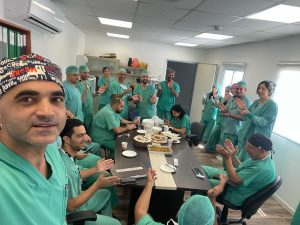
I started in November 2017, so it’s been about six years and a few months. My previous job was at Hadassah Hospital, where I was the Chief of General Surgery, Organ Transplants and the Trauma Unit for nine years. During this experience, I gained a lot of skills and knowledge, and at some point, I decided to come back home to serve my community.
Yes, I didn’t think about moving back home from Jerusalem for a while. But at some point, I came to visit the Nazareth Hospital. I saw the people and the environment: many experts treating patients with much care. It felt like a family. I was born here, but I was small, so I can’t remember. It felt like closing the cycle.
I also got inspired by Professor Fahed Hakim and his good plans for the hospital’s future. I thought I would like to help make these plans come true, so here I am, and I’m really happy. I’m satisfied with the workflow and what is going on here at the hospital. Even as a small hospital, we are pioneers in some issues, so I think we’re doing a great job.
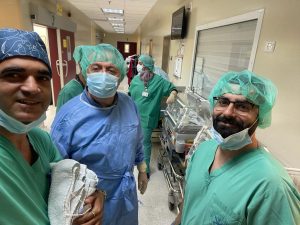
I came from Hadassah, which is a huge hospital. When I first came for a visit, I noticed that the buildings were smaller, but I was impressed once I went inside and saw the staff and experts that work here. At the Nazareth Hospital, we provide medical treatment and patient care to a high standard. We should plan to get more innovative, have more technologies and grow. And I don’t talk about buildings, but providing more medical services that we currently don’t have. We serve around 500,000 people in the area, and many patients must travel elsewhere if they need a specific procedure we don’t offer.
First of all, I take care of patient safety. I am also in charge of staff management, ensuring our workflow is safe, direct, and smooth. I often need to assign priority levels to different surgeries and gather a multidisciplinary team, including doctors, anaesthetists, X-ray technicians, etc. I need to gather them all for one surgery. I am also aware that surgeries are part of our daily work life. However, they are a major event for the patients and can be very terrifying. That’s why we need to deal with every patient with extra care, providing them with everything they need and making them go to the operating room as calm as possible and go out healthier.
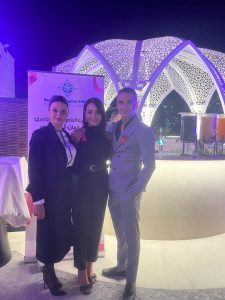
Tamer and two colleagues at the Breast Cancer Conference he organised.
The most challenging is to give the best patient care and get the best from the staff. We pray and make sure every surgery is safe and unique. We have to deal with many challenges during our day: there are a lot of potential disruptions. The most important thing is that every patient that comes in is satisfied, calm and happy that they chose us.
There is a lot of adrenaline from the morning until late night hours. One thing that makes me happy is that we see patients get better. They are so excited and surprised after the surgery that they often return to thank us and share that it was a good journey. We try to take care of every small detail: nobody needs to be cold or in pain. We also keep the families informed before, during and after the surgery. We are happy that despite the challenges, we’re getting excellent results.
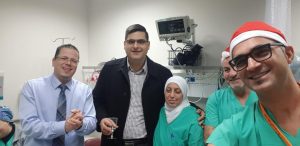
Yes, the Nazareth Academic School of Nursing sends us some students. We explain to the nursing students the importance of the operating room, the rules and our high standards. Lately, we’ve had a few new nurses join the operating rooms. We need to go from A to Z with them and explain all the protocols and procedures. Junior staff come in with many questions and fears, but after a few months, we can proudly say they are well-trained professionals. What makes our operating rooms unique is that we are family first, so we look after each other and second, we act like professionals.
I’ve done a few courses and have a subspeciality in organ transplant. When I was working in Hadassah, I was in charge and was there in every transplant surgery. I miss that because we don’t offer this kind of procedure here. However, lately, we are getting more technologies that help us in surgeries, which is also fascinating. For example, we have many laparoscopic surgeries, especially in general surgery and urology. We’ve been offering a new endourology service for three years now. Every year, doctors from around the country come here to receive training in this procedure.
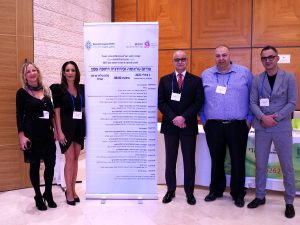
Tamer and his colleagues at the Trauma Conference he organised in 2020.
Yes, we do C-sections, and we have a unique procedure called FAUCS: French AmbUlatory Cesarean Section. We were the first hospital in Israel to perform this kind of surgery. One of our surgeons, Dr Handler, is one of the ten doctors in the world performing this surgery. During this procedure, we do the same skin incision, but inside, we divide the muscles and arrive at the baby from behind, not directly, making a small incision in the uterus. During the surgery, we try to provide a warm and supportive environment for the parents, and sometimes, we make a phone call on WhatsApp or a Zoom call with other family members. We want it to be a happy event involving the whole family. Seeing the parents’ happiness and joy is really touching, really unique. It’s the next step in patient care.
C-section procedures can be traumatic for patients who undergo an urgent C-section as you feel like they’re taking your baby away until you get better. Here, we are making a new standard of care for the whole family. We move from trauma to a happy event.
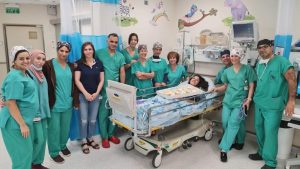
Tamer and colleagues celebrating 900 FAUCS at the Nazareth Hospital.
Yes, patients are usually under spinal anaesthesia. However, we’ve had three or four cases when we couldn’t offer spinal anaesthesia because of some deformation in the spinal cord. If that’s the case, the mother must go under general anaesthesia, and the husband stays in the operating room. We also place the baby on the mum after they are born. The demand for the FAUCS is going up yearly, and some patients come from far away, most of them from central Israel. We had lots of celebrities too. We’ve also been training surgeons from other hospitals to perform these surgeries.
Yeah, it’s so much faster. Mothers who had a regular C-section usually start to walk or go down from the bed five or seven hours after the procedure. Those who had the French C-section tend to walk by themselves from the operating table to their bed, and you can find them walking around the ward two hours later. One day after, they go back home like nothing happened. Some even return to work one or two weeks later: it’s incredible!
We try to give each patient what they need. Many of them are religious and ask for kosher meals, so we provide that. Some people must follow specific rules due to their religion, and we accommodate their requirements. We try to make everybody happy and satisfied and deal with every patient’s request promptly.
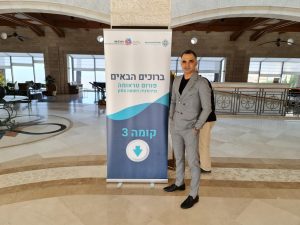
They come to visit patients. I’m happy to say that they come here every Friday between 12pm and 1pm for a small prayer. This prayer gives us the faith and the support we need to help us be stronger during the week ahead of us: every week we’re dealing with something new, some tragedy or a happy event. We’re so glad to have this time to share as a group of believers.
Recently, I started a new scholarship in management and leadership through the Ministry of Health and the Prime Minister’s Office here in Israel. We had the first meeting on Tuesday with 30 people from all over Israel; it was amazing. Everybody introduced themselves, and when I started to talk about the Nazareth Hospital, people were shocked to hear that we were 162 years old.
They were also surprised to hear about last year’s strike, the support from the staff members and how we act like a family. Everyone came to work anyway, even without knowing if there would be a salary. They were shocked and told me that nobody would have shown up at work the next day if this had happened in their hospital. I think our strength is, firstly, that we are a family. We have a lot of faith in the institution and give our best each day to make the impossible possible. I am proud to work here, and I think it’s really important to talk about it.
